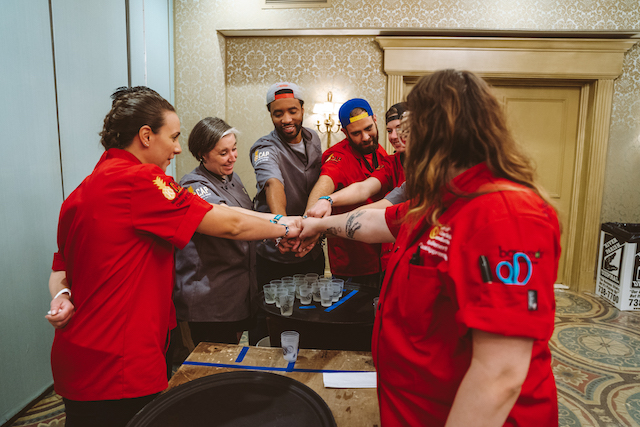TOTC’s Cocktail Apprentice Program is a unique mentoring, networking and learning opportunity for bartenders. Approaching its 10th year, the program is a week-long position in which apprentices (CAPs) train, prepare cocktails for Tales of the Cocktail seminars and also gain access to unique seminars specifically for CAPs. CAPs not only have the chance to learn from mentors on-site during the week of Tales, they develop relationships with mentors who will be available for the full extent of their careers.
Don Lee, formerly the beverage director of PDT in New York, is one of several managers of the Cocktail Apprentices. Last week, he gave us the low-down on what they’re looking for in the CAP applications. Here are a few of the highlights.
What’s the point of the apprentice program? Is it just about batching thousands of drinks?
The Cocktail Apprenticeship Program is first and foremost geared towards peer mentorship, Lee tells us. Though you will make drinks in bulk and gain high-volume bartending experience, that’s just one small aspect of the program.
“The idea is that you get to work with other bartenders from all around the world,” says Lee, “and you get a chance to have the experience seeing what other people do, seeing what we do, and hopefully bringing back those practices to where you work.”
Although your obligation to work lasts only one week, the network of people you’ll gain access to will endure through the entirely of your career. After completing your program, almost 400 alumni will become available to you to ask anything from questions about life to specific bar techniques.
What will the week be like?
In the first two days, you’ll be trained. Although there may be techniques you’re already very comfortable with, you’ll learn to do things in a specific, streamlined way to work as a part of a cohesive team. It will feel similar to the experience of opening a bar — hustling and working around the clock to make everything come together.
Wednesday through Friday, you’ll be making cocktails for all of the seminars. Best-case scenario, this work spans from about 6 a.m. to 6 p.m. during the seminar days, and at night, you’ll attend meetings and seminars targeted specifically to you. Expect to hear from speakers who are alumni and bartenders from around the world. They will be highly exclusive, and only CAPs have access, making them uniquely open, honest and helpful.
On Saturday, CAPs get to attend the Spirited Awards, a particularly spectacular night unlike any other for the spirits industry.
Sunday is dedicated to breaking down and cleaning up, and when that’s complete — enjoying the city.
What is the committee looking for in CAPs?
“We want people that are in a position to learn and a position to grow,” Lee says. “So, it doesn’t matter if you’re a first time bartender who’s just been doing this for six months or you’ve been doing this for 10 years, it’s just that question you have to ask yourself — am I looking to learn and grow?”
Not only is attitude taken into consideration, the board of judges is also looking for diversity.
“We tend to look for people in lots of different markets, we want people with lots of different experiences. The way we think about, it’s more like trying to create a class of people, a cohort of people, almost like a college class than it is trying to find the best people at any one specific job.”
In your application, it’s of the utmost importance that you emphasize who you are, rather than the breadth of experience you’ve had (though both are relevant). It’s not necessarily the folks with the most experience who are going to be chosen.
“We want to know who you are as a person, how you’re going to be able to learn and grow, and how you’re going to help facilitate that for others,” he explains.
What are the perks of being a CAP?
You’ll be able to reach out to obtain scholarships for continuing education opportunities. Every year, for example, Tales sends about 8-10 people to the B.A.R. 5 Day program, which costs between $5,000 to $6,000. It’s another invaluable opportunity to grow your career and build a name for yourself. This is another time in which CAPs will lean on each other and fellow alumni to succeed in this incredibly demanding program.
CAPs are also invited to apply for reimbursement for other learning opportunities.
“If you want to learn more about how to be better at your job, whether that means you want to take a class on Excel or you want to bone up on Spanish and get a second language under your belt, then that’s something that we can help you with,” Lee says. “And if you’re perhaps not from the U.S., we’ll help you take English classes, if English is something that you want to work on. Anything that makes sense that can help your career, if you can justify it, then you know, we’re looking to give that money away. So take the class, pay out of pocket and then we’ll reimburse you. It’s just another way that we can have everyone grow as a community.”
Then, pay it forward by proactively sharing those experiences with others. “We want to create leaders for the entire cocktail community,” Lee adds.
Also, former CAPs have access to a short-term disability plan. If you get hurt on the job, and you don’t have health coverage, TOTC can help CAPs.
Most importantly, you’ll have hands on experience working and learning alongside mentors. And these mentors will continue to support you throughout your career. You not only have peers to vouch for you, you also have alumni to say they know that if you made it through the program, you are capable and qualified.
How do applicants write a compelling application?
The board tries to make the application as simple as possible, and the primary focus is on the essay questions.
“The real thing that sets you apart from another applicant is we look at these essays … We don’t look at your name or where you work — we look at the essays without knowing anything else about you and that’s where we’ll take our first cut,” he says.
You’ll write an essay for each of the following:
- What do you feel distinguishes you from other applicants?
- What are your professional goals?
- What was the most memorable cocktail you had in the past six months and what was memorable about it?
“The purpose of these questions is to give you an opportunity to show who you are,” says Lee. “The biggest mistake people make here is they want to talk about all the things they love with cocktails. You love cocktails, we get it. You’ve read every Dave Wondrich book, you love Dale DeGroff — we get it, we all do. But if you tell us that and only that, then we don’t really know who you are as a person.”
Write something personal and sincere to distinguish who you are as a person rather than as a bartender (in other words, we are not looking for an over-the-top account of every relevant experience you’ve ever had).
Instead, Lee implores applicants to “tell us something about yourself, anything. It doesn’t have to be about cocktails … It doesn’t have to be something reflecting experience — they’re not looking for the people with the most experience. They’re looking for someone with something interesting to say … What makes you tick? What makes you interesting? What makes you different?” says Lee.
They’re looking for honesty, not for a single answer to any of the questions. For example, not everyone’s professional goals should include opening their own bar. It’s also all right to say you don’t know where you’d like your career to take you, but that you’re just hopeful to grow and explore.
And in terms of describing the best cocktail you’ve had, you’d be ill-advised to describe a drink you’ve made. It would be more compelling to describe a something like a memory of a perfect daiquiri at the beach, when it was just right for the place you were in and set the mood. “Knowing that you’re the kind of person who can kick back and enjoy a drink at the beach is more telling than someone who thinks they make the best drink,” Lee says.
“We want you to show us how you think, and we assume everyone thinks differently, so we want you to bring that diversity of thought and that diversity of experience and opinions to TOTC to be a part of this cohort.”
Last year, Lee says, about 600 people applied, and about 200 were dropped from consideration just based on the essay portion alone.
“If we can’t tell anything about you, other than that you’re a bartender and you like cocktails, you’re not going to make it past that first round. Even if what we get from this is that you’re a weirdo, we’d rather have somebody weird than somebody who has no personality other than that they like cocktails,” he says.
The next cut is based on where you work and your background (in conjunction with your essays), which narrows down another 200 people.
Finally, the last 200 people must be whittled down to 40. This comes down to a list of 60 people — 40 people notified of their acceptance first, and 20 people notified as alternates. Many of the alternates might get called in if someone is unable to commit to being in New Orleans, but at the very least, they’re encouraged to apply again.
And if you’re reading this now and you realize you’d like to make changes to your application, Lee says you can send in a second application and the committee will judge your application based on the second submission.
As far as whether it helps to know anyone — CAP alumni are the only people able to make recommendations. So, if you know a former CAP, get them to fill out a recommendation.
“Show off that you are a person that’s ready to learn, that’s really what we’re looking for and that somebody who cares about the community, someone that wants to share what they learn with the larger community.”





